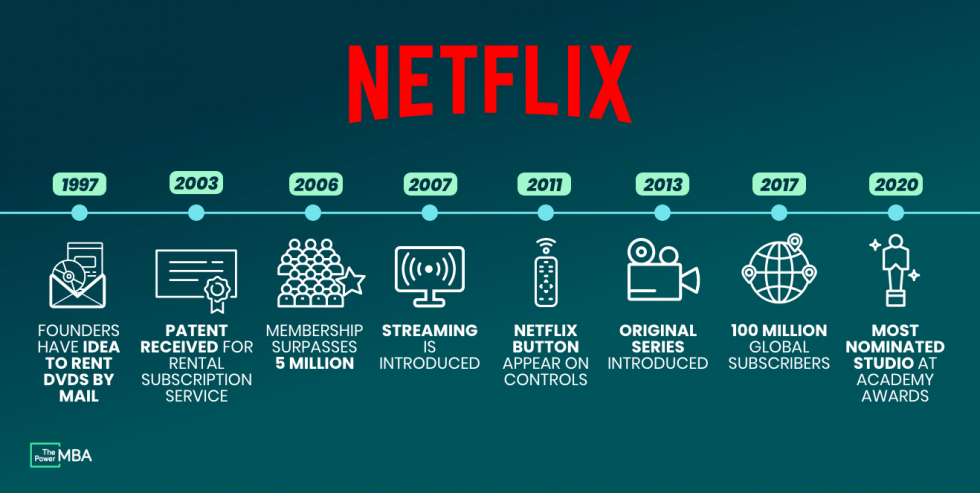What is business transformation?
Business transformation is a process where a company changes its operations, processes, and culture to better fit the industry, survive change, and possibly increase customer satisfaction and retention.
The goal of business process transformation is to make changes that will result in better operational performance and an improved customer experience.
It is a complete move that involves all kinds of staff and departments, from sales to marketing and product design.
Carrying out a business transformation is a strategic process that brings together various advancements across all aspects of the business—from culture to consumer insights and beyond.
Most of the time, changing your business is done to attract new customers or make it more valuable.
But sometimes, going through this type of transformation is essential for the business’s survival. This was the case with Netflix, which had to move from a rental service to becoming the biggest streaming platform in the world right now. Have a look at the timeline below:

About the business transformation process
The transformation process starts by setting clear goals about where the company wants to go and then creating an actionable plan to achieve those goals. You will need to implement new ideas, frameworks, and approaches to increase your company’s performance—whether it’s training your employees to improve customer service processes, or making important changes to your product.
What is a digital business transformation?
The true nature of a digital transformation for a corporation might be difficult for leadership teams to define. Digital technology integration is one notion that encompasses all business sectors.
It can be difficult to give a universal definition of digital transformation, but in general, it refers to integrating digital technology throughout the entire organization.
In addition, it’s a cultural revolution that requires businesses to question the existing quo, experiment regularly, and to learn to embrace and overcome failure.
What are the jobs in business transformation?
The term “business transformation” refers to the process of transforming a company from one state to another. The transformation can be in terms of products, processes, or organizational structure. In order for a company to transform itself, it needs to hire new employees who will make the change happen.
The idea behind this is that with changing times and new technologies, companies need to adapt themselves accordingly or they will be left behind.
Some of the main positions in business transformation include:
- Business Transformation Manager
- Business Transformation Consultant
- Business Transformation and Strategy
- PMO Lead
- Project Manager
- Program Manager
What is Business Transformation Consulting?
Business transformation consulting is a process that helps organizations identify and understand the root cause of their problems and assess their needs. It also helps them find solutions to those problems and establish ways to innovate.
Consulting helps clients come up with strategies that are competitive, build strong businesses, and take care of their valuable assets.
What does a business transformation consultant do?
Business transformation consultants help companies optimize their businesses for the future. They help businesses identify their strengths and weaknesses, and make decisions about the future of the company.
Business transformation consultants have the opportunity to work on projects that help clients integrate strategy, processes, technology, and information to increase effectiveness, reduce costs and improve profit and shareholder value. As business transformation consultants, they offer training and guidance to clients to support a new way of working.
What are business transformation strategies?
Business transformation strategies can be defined as the process of changing the way a company operates in order to remain competitive and survive in a changing market.
This process is usually initiated by either an internal or external event. It is important to note that not all businesses need to undergo this process, and sometimes it may not even be possible.
Business Transformation Types
Transforming a company requires more than just switching out manual processes for automated ones, even though that is a big part of it. The business transformation includes a wide range of changes that can be sorted into five broad categories.
Business process transformation
The focus of this type of business transformation is on changing internal processes. Common methods include automating and optimizing routine tasks.
Cultural transformation
For well-established businesses, this may be the most difficult transition to make.
Because of how slowly organizational cultures change over time, they are the most time-consuming kind of change to implement. As part of a cultural change, employees are often asked to change their habits and the way they do their jobs.
Management transformation
When it comes to making decisions quickly and adapting to new business objectives, traditional organizational structures aren’t always the best option. Because of this, management transformation is one solution to this issue. However, this involves interaction with others, easy access to relevant information, reliable ways of communicating and transparency throughout the organization.
Organizational transformation
Organizational transformation centers on the company’s most valuable asset: its employees.
The objective of an organization-wide overhaul is to streamline the way departments are staffed and organized. One of the main goals is to get rid of organizational barriers so that teams can work better together and people can be better managed.
Digital Transformation
In order to successfully undergo digital transformation, businesses must reevaluate their current business models from a digital strategic perspective. The management team creates a plan for digitally transforming the company and decides how they will use technology to enhance the product and all elements of the customer’s experience.